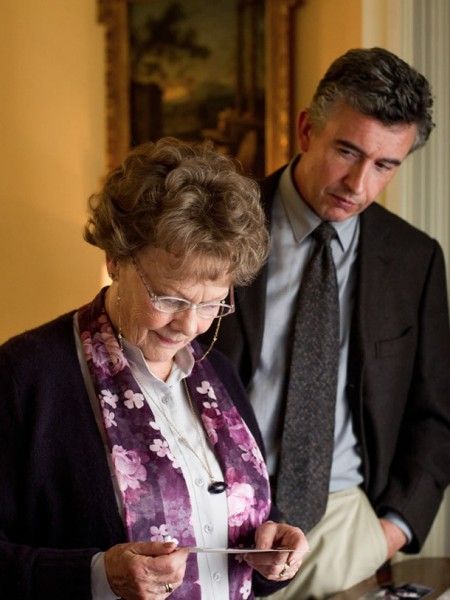At first glance, Philomena’s premise reads like that of a Lifetime movie of the week. An older, unassuming woman sets out in search of her long-lost son with the help of reluctant journalist. Life lessons are learned, hearts are warmed, and humor ensues. However, director Stephen Frears and co-writers Steve Coogan and Jeff Pope take this simple logline (based on a true story) and run with it in complete earnestness, crafting a sweet, thoughtful, and endearing story of guilt, redemption, and friendship that is buoyed by a remarkable performance from Judi Dench and excellent chemistry between the actress and her co-star, Steve Coogan. Hit the jump for my full review.
Based on true events, Philomena follows the story of Philomena Lee (Dench), a woman who years earlier was forced to give her illegitimate son up for adoption while living in a convent. She has kept this fact a secret for nearly 50 years, but on the eve of what would be her son’s birthday, she reveals his existence to her daughter (Anna Maxwell Martin) and subsequently sets out to track him down. When Lee’s daughter runs into disgraced political journalist Martin Sixsmith (Coogan) at a party, she asks him to aid her mother in what would be a “human interest” story. Sixmith initially rejects the idea, noting that human interest stories are written for and about the “weak-minded, vulnerable, and ignorant.” But seeing as how he’s out of a job, Sixsmith later changes his tune and grudgingly agrees to help Philomena find her son.
What ensues is a surprisingly compelling series of events that almost play out as a sort of road trip mystery movie. At the beginning of their endeavor, Sixsmith is put off by Lee’s naiveté and clearly feels he’s above this kind of story. However, the interplay between the two that follows—despite being obvious and clichéd—is highly entertaining. Coogan and Dench’s chemistry is wonderfully effortless, with Coogan playing the polite but annoyed acquaintance to Dench’s mild-mannered and chatty grandmother figure. The chemistry between the two keeps their rapport from ever feeling forced or mean spirited, and it’s a joy to watch them interact. In a welcome dramatic turn, Coogan takes an understated approach to Sixsmith that conveys irritation without delving into malice. By downplaying the “straight man” character, Coogan brings a refreshing sense of realness to Sixsmith; as annoyed as he might be by the quaint nature of Lee, he strains himself to be polite.
The real highlight of the film, though, is Dench. Philomena has lived a relatively sheltered and small-scale life in Ireland, and so she greets an American breakfast buffet with the kind of glee and excitement that is usually reserved for Christmas morning. She is naïve, yes, but she is not stupid, and Dench’s delicate performance prevents the character from becoming a joke. The complexity of Philomena’s emotions relating to her Catholic guilt and trustworthiness of the Church is phenomenally conveyed by Dench, who is able to portray Philomena’s intense internal struggle with a few simple facial gestures. Dench’s Philomena feels lived in, and it’s the kind of performance that evokes a sense of familiarity and empathy with the audience.
Frears uses flashbacks to tell the story of Lee’s life inside the convent, and these are spaced throughout the film in order to create a well-maintained air of suspense. The story is captivating in and of itself, but the material is elevated by Dench and Coogan’s powerful performances, which are themselves aided by Coogan and Pope’s smart and restrained script. That’s the key to Philomena as a whole: Frears and the script take a restrained approach to telling the story, which in turn prevents the film from delving into full maudlin mode.
Philomena is a tad obvious at times and the arcs of Coogan and Dench’s characters follow a fairly predictable path, but the movie is so charming and sincere that it’s tough to hold it against it. Frears lets his actors command the pic, and the result is the filmmaker’s best film in years.
We like to think of human interest stories as for the “simple-minded” and “easily manipulated,” but Philomena reminds us that behind the cloying narratives and obvious arcs are real human beings with real stories. There’s more to life than just “good guys” and “bad guys” or “happy ending” and “sad ending,” as the truth lies somewhere in between. The film reminds us of the importance of perspective, and though we’ve seen this kind of story told before, Philomena’s sincerity and deft approach allow us to forget about predictability and clichés and simply enjoy our time with two lovable characters for 97 minutes.
Rating: B+
Click here for all of our 2013 Toronto International Film Festival coverage thus far.



